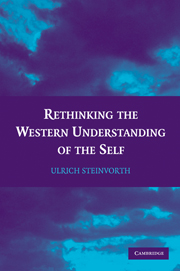Book contents
- Frontmatter
- Contents
- Preface
- Part I Introduction
- Part II Basics of Philosophical Psychology
- Part III The Cartesian Self in History
- Chapter 6 The Cause and Content of Modernity
- Chapter 7 The Second-Stage Rationality in History
- Chapter 8 Economic Rationality
- Chapter 9 The Cartesian Self in the Twentieth Century
- Part IV Value Spheres
- Part V A Self-Understanding Not Only for the West
- Select Bibliography
- Index
Chapter 9 - The Cartesian Self in the Twentieth Century
Published online by Cambridge University Press: 05 June 2012
- Frontmatter
- Contents
- Preface
- Part I Introduction
- Part II Basics of Philosophical Psychology
- Part III The Cartesian Self in History
- Chapter 6 The Cause and Content of Modernity
- Chapter 7 The Second-Stage Rationality in History
- Chapter 8 Economic Rationality
- Chapter 9 The Cartesian Self in the Twentieth Century
- Part IV Value Spheres
- Part V A Self-Understanding Not Only for the West
- Select Bibliography
- Index
Summary
If we look for traces of the cartesian self in history, the twentieth century is its best and saddest confirmation. It may seem that the most horrible crimes in human history that characterize it had to be committed for theorists to be forced into a clearer articulation of the Cartesian conception. Never before have there been such favorable technological and social conditions for enhancing happiness, and never before has evil of this degree been perpetrated. This at least is what many contemporaries think; rightly, to my judgment. The Cartesian conception provides us with a general explanation for the crimes and for why the chance of happiness has not been used, as it presumes that happiness is not the first aim in humans but the morally ambivalent ambition of extraordinariness. Such explanation of course is too abstract to be a historical explanation. Though we can always find a reason to prefer the bad in the intention of proving our freedom even of morality, and there will be always some individuals who choose this reason, this cannot explain the specific moral disasters of the twentieth century. Societies differ in moral abjection because they differ in the conditions that favor crimes.
The Cartesian conception can help identify such conditions. It assumes as a basic fact that we will always strive for extraordinariness. If we do not find ways for being extraordinarily good, we will prefer being extraordinarily evil to renouncing our ambition of extraordinariness.
- Type
- Chapter
- Information
- Rethinking the Western Understanding of the Self , pp. 87 - 94Publisher: Cambridge University PressPrint publication year: 2009

